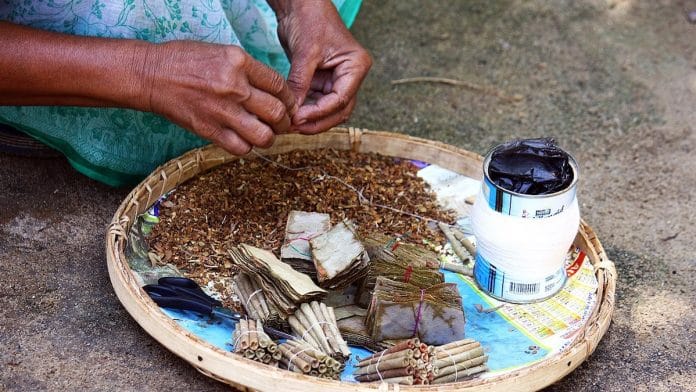New Delhi: Beedis shouldn’t be linked to cancer incidence. The reports of the World Health Organization (WHO) are unreliable. And the humble beedis can potentially become a counterpart of the Cuban cigar in the global market, with government support.
These are some of the claims members of Rashtriya Swayamsevak Sangh (RSS) affiliates and industry bodies made as they sought to allege that the Narendra Modi government is putting the livelihoods of millions of women in jeopardy through its proposed amendment to the Cigarettes and Other Tobacco Products Act (COTPA).
COTPA was enacted in 2003 to prohibit advertisement of cigarettes and other tobacco products in India, and to provide for the regulation of their trade and commerce, and production, supply and distribution.
In a proposed amendment bill, the Ministry of Health and Family Welfare has added a new section that makes it mandatory for people to obtain licences, permissions and registrations for selling and distributing any tobacco product.
To put forth their objections to the proposed amendments, two RSS affiliates, the Swadeshi Jagran Manch and Bharatiya Mazdoor Sangh, and the All India Beedi Industry Federation (AIBIF), organised an event in the national capital Tuesday.
The event was attended by Union Minister of State for Labour Rameshwar Teli, Rajya Sabha MPs Sushil Kumar Modi and Praful Patel, as well as Cuban Ambassador to India Alejandro Simancas Marin. They supported the beedi lobby, saying the industry provides widespread employment opportunities to people in rural areas and the government must preserve this.
Also read: India’s cannabis law is nonsensical, it’s time for ‘Big Bhang’ reform
Claims made at the event
AIBIF member Arjun Khanna told ThePrint that theirs is a compliant industry, which pays all taxes and follows all the rules.
“We want the government to distinguish beedis from other tobacco products as it supports millions of women in rural hinterlands. These women have been able to educate their children from the income they get by rolling beedis,” he said.
The event organisers also released a report titled “A Study on the Status of Alternate Employment Schemes for Women Beedi Rollers”, which seeks to highlight the potential impact of the COTPA amendment on millions of women beedi rollers in the country.
Until skill-building and alternative employment is provided on a large scale for their livelihood, beedi rolling is the only viable occupation for millions of women across India, the report said.
Talking about how the new regulations will affect those involved in beedi sales, it added that tobacco products “are mostly sold by small vendors and hawkers who have a small scale set-up for selling tobacco products”.
Speaking at the event, Ashwini Mahajan, national convener of the Swadeshi Jagran Manch, said there is no study that shows beedi can cause cancer. He claimed that the panel that drafted this amendment included WHO experts.
“We all saw WHO (get) exposed during the Covid pandemic. We saw how it bends to foreign forces. There is no need to believe WHO,” Mahajan said.
Bharatiya Mazdoor Sangh’s B. Surendran said the WHO has claimed that over “13 million” people die in India from tobacco consumption annually, but the global health body didn’t publish “full data” of “who died in which state”.
Surendran added that the government “should not touch the beedi industry unless it has alternative employment opportunities”.
According to the WHO, tobacco use accounts for nearly 1.35 million deaths every year. “India is also the second largest consumer and producer of tobacco. A variety of tobacco products are available at very low prices in the country,” it said, adding that data shows nearly 267 million adults (15 years and above) in India (29 per cent of all adults) are users of tobacco.
Also read: Lung cancer is deadly and an unequal burden. Poor countries deserve disease-free ageing too
‘This is happening because beedi lobby is weak’
Rajya Sabha MP and Bihar Bharatiya Janata Party (BJP) leader Sushil Kumar Modi said the reason the government sometimes overlooks such concerns is because the “beedi lobby in India is weak”.
“Beedi industry has not lobbied itself that much. In India, lobbying is considered a bad word, but in the US lobbying is an organised sector,” he added.
“Lawmakers don’t have all the information, which is why sometimes laws are drafted with incomplete information,” he said, adding that while he has met a lot of cancer patients, he has never met one who got cancer because of beedi — all of them smoked cigarettes.
The MP suggested that the organisers of the event put together relevant documents and information, and make an organised representation to the government about their objections to the proposed amendments.
“No government will really want people to lose jobs,” he said.
NCP MP, Cuban ambassador support cause
Union Labour Minister Bhupender Yadav was to attend the event, but instead sent Rameshwar Teli, Minister of State, Labour, on his behalf.
Teli listed a number of central schemes that can help beedi workers secure their livelihoods, and urged the organisers to get the industry workers to register on the government’s newly-launched e-Shram portal for employment.
He thanked the report’s authors for highlighting the plight of beedi workers, and assured the organisers that the points raised by them will be conveyed to the minister.
Nationalist Congress Party (NCP) leader and Rajya Sabha MP Praful Patel said “if Cuba can be known for cigars, why can we not have the same ecosystem for beedis?”
Cuban Ambassador to India Alejandro Simancas Marin said India’s tobacco industry has a lot of similarities with the Cuban cigar industry.
Waving a Cigar on the stage, he added that his government’s support to preserve the culture of Cuban tobacco industry helped create such “masterpieces” and turn it into a premium product with a global market.
(Edited by Amit Upadhyaya)
Also read: Smoking likely to worsen Covid severity, increase risk of death, UK study reveals






